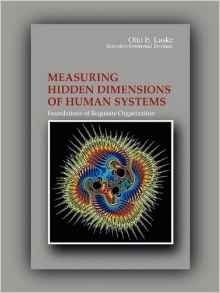Can you imagine being part of a dialog in which you not only listen to what your interlocutor is saying but also to the underlying structure of his or her thinking? If you had knowledge of the thought form structure of human sense making, this way of listening, called “dialectical”, would enable you to point to what is missing (absent) both in your own and others’ verbal communication. It would thereby help you deepen your and others' thinking in real-time dialog. Your critical listening would then not be restricted to content but would equally focus on underlying thought structures used by your interlocutors. In a team and group context, you would be able to point to interlocutors’ thought gaps in a compassionate, inter-developmental, way. Such gaps are not “academic”. They are more serious than that since they translate into gaps between how people think and how reality works. It is this kind of dialog that the present article introduces. The article paves the way for an intelligent reading and teaching of the Manual of Dialectical Thought Forms (DTFM), which in the near future will become available in pdf form on this website under Publications. The article introduces cutting-edge thinking tools... Read More...
Tag: collaborative intelligence
A New Era Begins at the Interdevelopmental Institute, Gloucester, MA, USA (IDM)
As the Interdevelopmental Institute (IDM) enters a new era, it wants to communicate what it has learned and what, based on its learning over nearly 20 years, it can now deliver to CEOs and Boards. Find out how the Institute's main methodology, called Constructive Developmental Framework (CDF), addresses contemporary issues such as the digital transformation of businesses in all of its facets. Take note of the critical realism CDF tools embody (thanks to Roy Bhaskar's work on a dialectical ontology), and IDM's critical theory practice that now provides a new home for Frankfurt School insights just in time ... Sincere thanks to the international community of students who have made IDM widely known through their own work over many years! A New Beginning at IDM Read More...
Human Developmental Processes as Key to Creating Impactful Leadership
Copyright 2016 by Graham Boyd & Otto Laske In this article, the authors put forth a new approach to distributed leadership based on research in adult development and the pedagogical thought of Vygotsky, originator of the notion of zones of proximal development. The article attempts to re-totalize the issues neglected, or fragmented, by theories of holacracy and other models of shared leadership, in order to arrive at a deeper understanding of contemporary attempts to redesign organizational work in the direction of “organizations without managerial hierarchies”. In so doing, the authors leave behind present notions of “individual coaching”, “team coaching”, “managerial hierarchy”, and “organizational behavior”, among others, focusing squarely on contributors’ frame of reference (FoR; world view) that determines how they put their capabilities to work collaboratively and what their needs for developmental support are. The article’s essential argument is summarized in Tables 2a and 2b, one for each dimension of adult development. The authors come to the conclusion that for holacracy and similar models to succeed, much more attention must be paid to the fact that unconventional organization designs challenge contributors’ self-identity and psychological well-being. They also show that a one-sided focus on tasks and competences (Task House) is counter-productive... Read More...
Seeing WORK as a Medium of Adult Development
In this short article I am pointing to some deficiencies of the present notion of DDO, "deliberately developmental organizations". In contrast, I present a short apercu on the benefits of CDF, the Constructive Developmental Framework which I see as a more comprehensive approach to understanding the nature of work and a set of tools for designing new work environments. Seeing WORK As A Medium of Adult Development Read More...
What is CDF: An Introduction for Beginners
This article introduces to the Constructive Developmental Framework (CDF), addressing those readers who want to learn to use the methodology. CDF is seen as a comprehensive framework for consulting and coaching, much like NLP, but on a higher level of consciousness. Its main intellectual strength lies in establishing a methodology for the deconstruction, through dialog, of less developed thinking and meaning making, for the sake of client benefit. Viewed more broadly, CDF is a framework for “coaching for society” that can lift individuals’ and teams’ developmental level. What is CDF -- An Introduction for Beginners Read More...
Buchbesprechung von Otto Laske’s “Dialectical Thinking for Integral Leaders: A Primer”
Buchbesprechung Otto Laske, Dialectical Thinking For Integral Leaders: A Primer Integral Publishers, ISBN 978-0-9904419-9-1, 2015 (June) Zusammenfassung In dieser Buchbesprechung hebt Michael Habecker die wesentlichen Gedanken eines jeden Kapitels des obigen Buches heraus und schafft dadurch eine klare Zusammenfassung der Intentionen von Otto Laske. Michael Habecker Das neue Buch von Otto Laske, als eine Zusammenfassung seiner Arbeit zum dialektischen Denken, leistet Wesentliches zur Theorie und Praxis menschlichen Denkens als eines unserer wichtigsten Instrumente und Möglichkeiten zum Erkennen und Verstehen von uns selbst, anderen Menschen und der Welt als Ganzes. Es richtet sich im Titel an „integrale“ Führungspersonen und versteht sich in diesem Sinne als ein Angebot an diesem Personenkreis und an die integrale Theorie und Praxis als Ganzes. Dieser Primer fasst die Inhalte des Buches Measuring Hidden Dimensions: The Art and Science of Fully Engaging Adults Band 2 von Otto Laske zusammen, von dem es noch keine deutschsprachige Übersetzung gibt. Übersetzt ist jedoch der Band 1, Potenziale in Menschen erkennen, wecken und messen: Handbuch der entwicklungsorientierten Beratung, in dem es um die sozial emotionale Entwicklung des Menschen geht, welche der Autor klar von der Entwicklung dialektischen Denkens, als dem Gipfel erwachsenen kognitiven Denkens unterscheidet, um die es in dem Primer... Read More...
